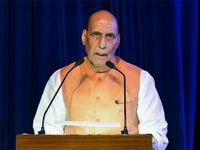New Delhi, May 7 (ANI): In a significant escalation of military action, Union Defence Minister Rajnath Singh held discussions with the chiefs of the Indian Army, Indian Air Force, and Indian Navy following the execution of Operation Sindoor, which targeted terrorist hideouts in Pakistan and Pakistan-occupied Jammu and Kashmir during the early hours of Wednesday, May 7, 2025.
The operation, which was a direct response to the Pahalgam terror attack that claimed 26 lives on April 22, marked India's most profound military engagement inside Pakistani territory since 1971. This unprecedented action aimed at dismantling terror camps linked to the Jaish-e-Mohammed (JeM) and Lashkar-e-Taiba (LeT) organizations, which have been implicated in orchestrating attacks against India.
According to the Ministry of Defence (MoD), the operation was described as "a precise and restrained response to the barbaric Pahalgam terror attack," targeting the very roots of cross-border terror planning. The MoD stated, "A little while ago, the Indian Armed Forces launched 'Operation Sindoor', hitting terrorist infrastructure in Pakistan and Pakistan-occupied Jammu and Kashmir from where terrorist attacks against India have been planned and directed." This operation successfully struck nine locations, four within Pakistan, including Bahawalpur, Muridke, and Sialkot, as well as five sites in Pakistan-occupied Jammu and Kashmir.
Rajnath Singh's conversations with military leaders followed the operation, as the MoD prepared to hold a press briefing at 10:00 AM on the same day. The briefing was anticipated to provide further details regarding the operation and its implications.
The strikes executed during Operation Sindoor were characterized as focused and measured, with the MoD emphasizing that no Pakistani military facilities were targeted, thereby maintaining a non-escalatory stance. The statement from the MoD reassured that India had demonstrated considerable restraint in its choice of targets and the method of execution.
Prime Minister Narendra Modi was reportedly monitoring the operation throughout the night, ensuring that the actions taken were in line with national security objectives. Sources confirmed that all nine targets were successfully struck, aiming specifically at high-ranking leaders within the JeM and LeT who have been instrumental in planning and executing terrorist activities against India.
However, the Pakistan Foreign Ministry responded sharply to the strikes, alleging that the Indian Air Force had violated Pakistan's sovereignty in an "unprovoked and blatant act of war." They claimed that the Indian forces used standoff weapons to target civilian populations in Muridke and Bahawalpur, as well as across the Line of Control in Kotli and Muzaffarabad. The Foreign Ministry's statement condemned the attacks and highlighted the potential for increasing tensions in the region.
Muridke, located near Lahore, is known to host a significant base for Lashkar-e-Taiba, while Bahawalpur serves as a key stronghold for Jaish-e-Mohammed. The targeted strikes also included regions like Kotli and Muzaffarabad in Pakistan-occupied Kashmir, where both terror groups have maintained camps and training facilities for years.
The name "Operation Sindoor" holds cultural significance, referencing the red vermillion traditionally worn by Hindu women to denote their marital status. This symbolic choice reflects the emotional weight of the operation, particularly as it seeks to avenge the lives lost in the Pahalgam attack, where some women witnessed their husbands being killed, including an Indian Navy officer.
As the situation continues to unfold, analysts are closely monitoring the implications of this military action. The operation not only represents a tactical shift in India's approach to counter-terrorism but also raises questions about the potential for further escalation in an already volatile region.
In the wake of Operation Sindoor, the Indian government faces the challenge of balancing military action with diplomatic efforts to avoid a broader conflict. The international community is watching closely, as any misstep could lead to significant geopolitical ramifications.
As the press briefing scheduled for later today approaches, many are eager to understand how the Indian government plans to navigate the aftermath of these strikes and what measures it will take to ensure national security while maintaining regional stability.
Operation Sindoor stands as a testament to India's commitment to combating terrorism, but it also highlights the delicate nature of military engagements in a region fraught with historical tensions and conflicts. The coming days will be crucial in determining the next steps for both India and Pakistan as they navigate the complexities of their relationship in light of these recent developments.

